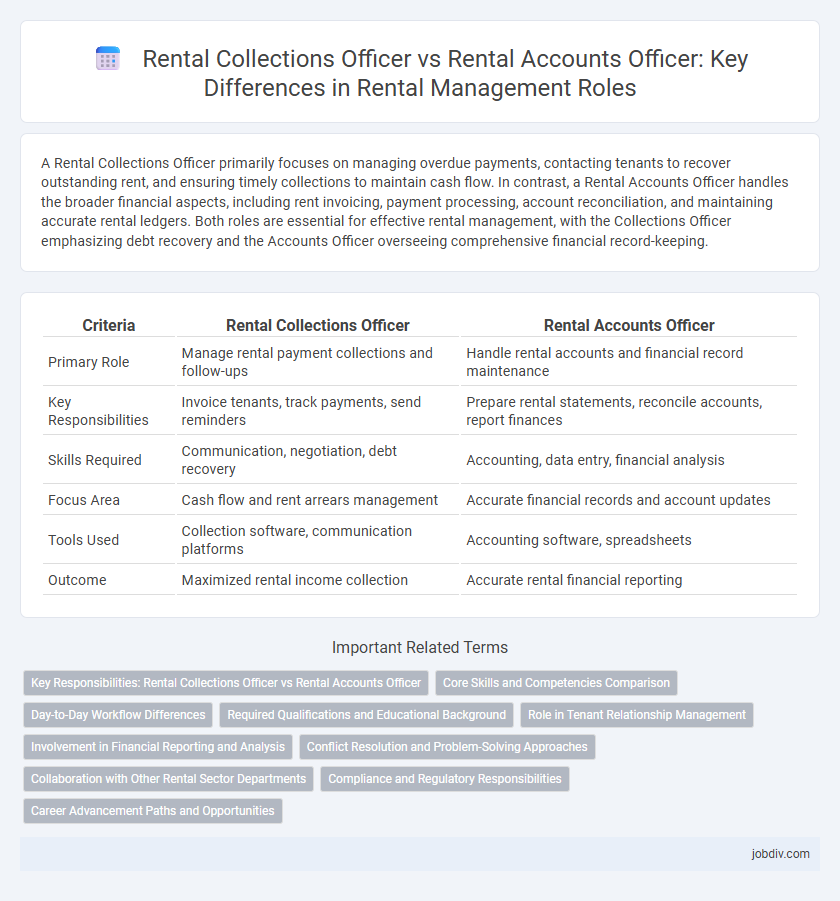A Rental Collections Officer primarily focuses on managing overdue payments, contacting tenants to recover outstanding rent, and ensuring timely collections to maintain cash flow. In contrast, a Rental Accounts Officer handles the broader financial aspects, including rent invoicing, payment processing, account reconciliation, and maintaining accurate rental ledgers. Both roles are essential for effective rental management, with the Collections Officer emphasizing debt recovery and the Accounts Officer overseeing comprehensive financial record-keeping.
Table of Comparison
| Criteria | Rental Collections Officer | Rental Accounts Officer |
|---|---|---|
| Primary Role | Manage rental payment collections and follow-ups | Handle rental accounts and financial record maintenance |
| Key Responsibilities | Invoice tenants, track payments, send reminders | Prepare rental statements, reconcile accounts, report finances |
| Skills Required | Communication, negotiation, debt recovery | Accounting, data entry, financial analysis |
| Focus Area | Cash flow and rent arrears management | Accurate financial records and account updates |
| Tools Used | Collection software, communication platforms | Accounting software, spreadsheets |
| Outcome | Maximized rental income collection | Accurate rental financial reporting |
Key Responsibilities: Rental Collections Officer vs Rental Accounts Officer
Rental Collections Officers primarily manage the timely collection of rent payments, enforce lease agreements, and handle tenant communication regarding arrears and payment plans. Rental Accounts Officers focus on maintaining accurate financial records, processing rent payments, reconciling accounts, and preparing detailed reports for management. Both roles are essential for effective rental revenue management but emphasize payment recovery versus financial record-keeping and accounting accuracy.
Core Skills and Competencies Comparison
Rental Collections Officers excel in debt recovery, negotiation, and maintaining tenant communication, emphasizing strong interpersonal and conflict resolution skills essential for managing overdue payments. Rental Accounts Officers focus on accurate financial record-keeping, rent invoicing, and payment reconciliation, requiring proficiency in accounting software, attention to detail, and data management. Both roles demand a solid understanding of rental laws and property management systems but differ primarily in their emphasis on financial transactions versus tenant relationship management.
Day-to-Day Workflow Differences
Rental Collections Officers primarily focus on tracking and recovering overdue rental payments, handling tenant communication for arrears, and coordinating payment plans. Rental Accounts Officers manage the accurate recording of all rental transactions, reconcile accounts, process rent deposits, and generate financial reports for property management. While Collections Officers emphasize debtor management and resolution, Accounts Officers ensure precise financial documentation and compliance with accounting standards.
Required Qualifications and Educational Background
Rental Collections Officers typically require a diploma or degree in finance, accounting, or business administration, with strong knowledge of debt collection processes and customer service skills. Rental Accounts Officers often hold qualifications in accounting or finance, such as a bachelor's degree, and possess experience in rent ledger management, invoicing, and financial reporting. Both roles demand proficiency in financial software and an understanding of rental property regulations to ensure accurate account handling and collections.
Role in Tenant Relationship Management
A Rental Collections Officer primarily manages the recovery of overdue rent payments, ensuring timely collections to maintain consistent cash flow for property owners. In contrast, a Rental Accounts Officer oversees tenant accounts by tracking payments, generating statements, and managing deposit returns, facilitating transparent financial interactions. Both roles are integral to tenant relationship management, with the Collections Officer focusing on payment enforcement and the Accounts Officer emphasizing accurate financial record-keeping and communication.
Involvement in Financial Reporting and Analysis
Rental Collections Officers primarily focus on monitoring tenant payments, resolving outstanding rent debts, and ensuring timely collection to maintain positive cash flow. Rental Accounts Officers are more involved in maintaining accurate rental ledgers, preparing financial reports, and analyzing rental income trends to support budget forecasting and financial decision-making. Both roles contribute to financial reporting, but Rental Accounts Officers play a central role in detailed analysis and reconciliations of rental accounts.
Conflict Resolution and Problem-Solving Approaches
A Rental Collections Officer primarily focuses on resolving payment disputes and overdue account conflicts by employing negotiation skills and payment plan facilitation to recover outstanding rents efficiently. In contrast, a Rental Accounts Officer addresses discrepancies within rental accounts, using detailed financial analysis and record reconciliation to identify errors and prevent ongoing conflicts. Both roles require strong problem-solving abilities but differ in their approach, with Collections Officers emphasizing direct debtor interaction and Accounts Officers concentrating on internal account accuracy.
Collaboration with Other Rental Sector Departments
Rental Collections Officers coordinate closely with Rental Accounts Officers to ensure accurate tracking of payment statuses and resolve outstanding balances efficiently. Both roles collaborate with leasing and tenant relations departments to streamline financial reporting and maintain tenant satisfaction. Effective communication between these officers and property management teams enhances rental income recovery and reduces delinquencies.
Compliance and Regulatory Responsibilities
A Rental Collections Officer primarily ensures timely rent payments by enforcing lease agreements and managing delinquent accounts in compliance with housing regulations. A Rental Accounts Officer oversees financial records, ensures accurate rent reconciliation, and maintains adherence to statutory requirements such as tax reporting and audit standards. Both roles demand thorough knowledge of rental laws and regulatory frameworks to prevent legal disputes and ensure transparent financial operations.
Career Advancement Paths and Opportunities
Rental Collections Officers primarily focus on recovering overdue payments and managing tenant delinquency, developing strong negotiation and communication skills valuable for advancing into senior collections or credit management roles. Rental Accounts Officers handle rental payment processing, account reconciliations, and financial reporting, gaining expertise in accounting systems and financial analysis that opens pathways to higher accounting or property management positions. Both roles offer career advancement opportunities within real estate finance, with potential growth into roles like Credit Analyst, Property Manager, or Finance Supervisor based on accumulated experience and specialized knowledge.
Rental Collections Officer vs Rental Accounts Officer Infographic

 jobdiv.com
jobdiv.com